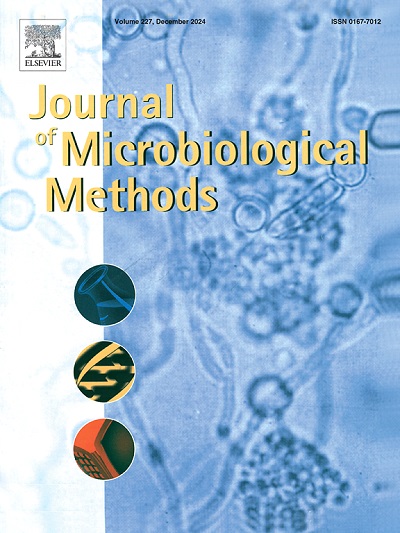机器学习驱动的分析:利用MALDI-TOF质谱快速鉴定肺炎克雷伯菌耐药性。
IF 1.9
4区 生物学
Q4 BIOCHEMICAL RESEARCH METHODS
引用次数: 0
摘要
肺炎克雷伯菌耐药表型的早期识别对于有效的临床干预、感染管理以及预防耐药性的发展和传播至关重要。本研究旨在利用基质辅助激光解吸/电离飞行时间质谱(MALDI-TOF MS)数据构建多个机器学习模型,快速、全面地预测肺炎凯布菌对9种常用抗菌药物的敏感性。一共484张 K。收集浙江省荣军医院分离的肺炎菌,对9种抗生素进行体外药敏试验。开发并评估了六种监督学习模型:随机森林、极端梯度增强(XGBoost)、自适应增强(AdaBoost)、逻辑回归、多层感知器和支持向量机。使用测试分数、十倍交叉验证、准确性、特异性、F1评分、AUROC和95% %CI来评估性能。该模型对阿米卡星和复方新诺明的预测效果最好,而对左氧氟沙星的预测效果最差。AdaBoost和XGBoost对所有9种抗菌药物的AUROC值均≥0.8,具有较高的预测性能。XGBoost模型在评估指标中表现出强大的性能和稳定性。基于XGBoost模型的SHAP分析确定了阿米卡星的4517.5 ± 2.5 Da和复方新诺明的6022.5 ± 2.5 Da等关键特征。研究得出结论,利用机器学习模型分析MALDI-TOF MS数据可以快速预测肺炎克雷伯菌的抗生素敏感性,将耐药检测时间缩短至1-2 h,加快临床决策。本文章由计算机程序翻译,如有差异,请以英文原文为准。
Machine learning powered profiling: Rapid identification of Klebsiella Pneumoniae drug resistance from MALDI-TOF MS
The early identification of drug-resistant phenotypes in Klebsiella pneumoniae is essential for effective clinical intervention, infection management, and the prevention of resistance development and spread. This study aimed to construct multiple machine-learning models to rapidly and comprehensively predict susceptibility to nine common antimicrobial drugs using matrix-assisted laser desorption/ionization time-of-flight mass spectrometry (MALDI-TOF MS) data of K. pneumoniae. A total of 484 K. pneumoniae isolates from Zhejiang Rongjun Hospital were collected and tested for in vitro susceptibility to nine antibiotics. Six supervised learning models were developed and evaluated: Random Forest, eXtreme Gradient Boosting (XGBoost), Adaptive Boosting (AdaBoost), Logistic Regression, Multilayer Perceptron, and Support Vector Machine. Performance was assessed using test score, ten-fold cross-validation, accuracy, specificity, F1 score, AUROC, and 95 %CI. The models performed best for Amikacin and Co-trimoxazole, whilst exhibiting the poorest predictive efficacy for levofloxacin. AdaBoost and XGBoost achieved high predictive performance with AUROC values ≥0.8 for all nine antimicrobial drugs. The XGBoost model demonstrated strong performance and stability across evaluation metrics. SHAP analysis based on the XGBoost model identified key features such as 4517.5 ± 2.5 Da for Amikacin and 6022.5 ± 2.5 Da for Co-trimoxazole. The study concluded that analyzing MALDI-TOF MS data with machine-learning models can rapidly predict the antibiotic susceptibility of K. pneumoniae, reducing resistance detection time to 1–2 h and accelerating clinical decision-making.
求助全文
通过发布文献求助,成功后即可免费获取论文全文。
去求助
来源期刊

Journal of microbiological methods
生物-生化研究方法
CiteScore
4.30
自引率
4.50%
发文量
151
审稿时长
29 days
期刊介绍:
The Journal of Microbiological Methods publishes scholarly and original articles, notes and review articles. These articles must include novel and/or state-of-the-art methods, or significant improvements to existing methods. Novel and innovative applications of current methods that are validated and useful will also be published. JMM strives for scholarship, innovation and excellence. This demands scientific rigour, the best available methods and technologies, correctly replicated experiments/tests, the inclusion of proper controls, calibrations, and the correct statistical analysis. The presentation of the data must support the interpretation of the method/approach.
All aspects of microbiology are covered, except virology. These include agricultural microbiology, applied and environmental microbiology, bioassays, bioinformatics, biotechnology, biochemical microbiology, clinical microbiology, diagnostics, food monitoring and quality control microbiology, microbial genetics and genomics, geomicrobiology, microbiome methods regardless of habitat, high through-put sequencing methods and analysis, microbial pathogenesis and host responses, metabolomics, metagenomics, metaproteomics, microbial ecology and diversity, microbial physiology, microbial ultra-structure, microscopic and imaging methods, molecular microbiology, mycology, novel mathematical microbiology and modelling, parasitology, plant-microbe interactions, protein markers/profiles, proteomics, pyrosequencing, public health microbiology, radioisotopes applied to microbiology, robotics applied to microbiological methods,rumen microbiology, microbiological methods for space missions and extreme environments, sampling methods and samplers, soil and sediment microbiology, transcriptomics, veterinary microbiology, sero-diagnostics and typing/identification.
 求助内容:
求助内容: 应助结果提醒方式:
应助结果提醒方式:


